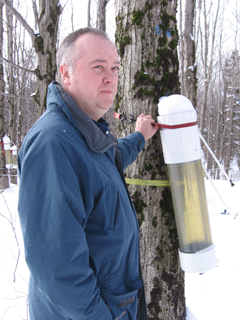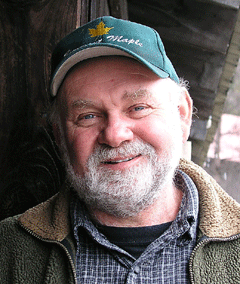Climate Change Not So Sweet
Air Date: Week of March 30, 2007

Dr. Timothy Perkins, director University of Vermont Proctor Maple Research Center standing next to a maple tree that was tapped as part of research to measure the sweetness of the sap during the season, and whether climate change will affect sugar content. (Photo: John Dillon)
Maple sugar makers are learning first-hand the effects of global warming. Mild winters and early sap runs are forcing many producers to try new techniques to adapt. Vermont Public Radio’s John Dillon went out with a seventh generation maple sugarer on a tap run and has our story.
Transcript
GELLERMAN: This is the season for making maple syrup, here's the basic recipe: Stick a tap into any one of the millions of sugar maples that grow in the northeastern US and Canada. Gather about 40 gallons of the sap that drips out, and slowly boil it down to make one gallon of syrup. It’s easy but you need the cooperation of Mother Nature, the right rhythm of freezing nights and warm days in the winter and early spring to make the sap flow.
Even small changes in temperature can stop the run. And as the world warms, sugar-makers are worried that their livelihood – and their way of life – might be disappearing John Dillon of Vermont Public Radio has our report from the sugarbush.
DILLON: On the first day of spring, Burr Morse puts out the last of his three thousand taps. The bigger maples get two of the little spigots.
MORSE: Big old trees have coarse bark. Sometimes you just knock a piece of bark off.
[DRILLING NOISE AND SQUIRREL SOUNDS]
DILLON: The red squirrels chattering overhead don't seem to like the intrusion.
MORSE: Squirrels down there are kind of upset with what we're doing. It’s their tree.

Burr Morse (Photo: Jeb Wallace-Brodeur/Times Argus)
DILLON: The Morse family has been tapping trees and making syrup since before the Civil War.
[CRUNCHING FOOTSTEPS ON SNOW]
DILLON: As he moves to the next tree, Morse says maple sugaring has become less predictable in recent years. March is the traditional start of sugaring here. But more recently, the first big sap flow has come in mid-winter.
MORSE: Late years, I’m talking the last 20 or so, ah we've had many, many early years, including last winter we had a big run in January.
DILLON: Morse describes himself as a reluctant believer in climate change. He's a seventh generation Vermonter, and Vermonters he says, usually don't get too upset about the weather.
MORSE: But finally, a couple years ago, I, I'd been through enough kind of poor sugar seasons in the last 20 years, and it was really beginning to pry on me that something was up with the weather. And then last Christmas I was cutting my Christmas trees most of the month of December in my short sleeve shirt. So, I just feel like it's happening, the climate is warming and I think the scientists have proof.
PERKINS: They're down there: those white things hanging on trees.
DILLON: One of those scientists is Dr. Timothy Perkins. In a grove of maples in the foothills of the Green Mountains, he's also gathering sap.
PERKINS: Right now there's 30.
[WALKING ON SNOW]
DILLON: Perkins is the director of the University of Vermont's Proctor Maple Research Center. Scientists at the center have collected sap to measure the ratio of sugar to water over time. The research may help sugar makers adapt to a warming world.
PERKINS: Sugar content changes during the season. Um, it changes from season to season, and it's quite a lot different from tree to tree so there are a number of variables that go into it. But certainly earlier in the year, what we would consider to be earlier in the year, the sugar content is much lower. We don't know how that will change with changing climate.

Dr. Timothy Perkins, director University of Vermont Proctor Maple Research Center standing next to a maple tree that was tapped as part of research to measure the sweetness of the sap during the season, and whether climate change will affect sugar content. (Photo: John Dillon)
DILLON: Skeptics argue that the recent mild winters in New England are due to natural variation.
But Perkins says it appears the climate is getting warmer over time. He's completed a separate study that uses 40 years of data from all over the northeast to answer the big question: What will rising temperatures mean for the timing and duration of the sugaring season?
The research shows that the sap is starting to run significantly earlier. The study also found that the length of the season decreased by about ten percent. It could be a make or break problem for the maple industry.
PERKINS: If the season itself is changing in duration, becoming shorter, then that will have a direct impact on yields, and will basically hurt producers in their pocketbook.
[BANQUET SOUNDS]
DILLON: At the Vermont Sugar Makers Association annual banquet earlier this winter, the meeting opened with a prayer. Maple prayer "Help us keep our maple trees healthy, and keep our product in the forefront of the world market."
Jacques Couture is a sugar maker from Westfield in northeastern Vermont. He thinks humans have a role in climate change.
COUTURE: As humankind we need to do all we can to not create emissions that might be furthering that along.
DILLON: The two thousand maple farmers in Vermont still make about half a million gallons a year – the most of any state.
Although the season is getting shorter and starting earlier, producers – like Couture – are starting to adapt with Yankee ingenuity. Tap holes dry up in about six weeks. That's a problem if the season starts in January and then cold weather returns and stops the run. So some sugar makers are using new micro taps that can stay in the tree longer. They also use vacuum systems that give nature a boost in getting the sap from the trees.
COUTURE: I don't think we're looking at something that's really bleak. We're seeing something happening, but I am still very upbeat on the Vermont maple industry and it's future.
DILLON: But scientists like Timothy Perkins of the University of Vermont say that in the long run global warming may mean far fewer maple trees in New England. The forest could change to a mix that's more adapted to warmer temperatures, like hickory and oak.
[LIGHTING SOUND]
DILLON: Burr Morse isn't ready to let that happen. As he fires up the evaporator to boil the day's sap run, he says sugar makers are uniquely qualified to speak out on climate change.
MORSE: I know there's naysayers about the global warming. And I've heard em talk and I’d love to believe them, but they haven't been sugar makers for the last 20 years and, fact is for the last 20 years we've had too many bad seasons caused by night freezes that weren't quite cold enough.
DILLON: Burr Morse says he's made the personal decision to take a more public stand in fighting the problem of climate change.
For Living on Earth, I'm John Dillon in East Montpelier, Vermont.
[SAP BOILING SOUNDS]
Links
Living on Earth wants to hear from you!
Living on Earth
62 Calef Highway, Suite 212
Lee, NH 03861
Telephone: 617-287-4121
E-mail: comments@loe.org
Newsletter [Click here]
Donate to Living on Earth!
Living on Earth is an independent media program and relies entirely on contributions from listeners and institutions supporting public service. Please donate now to preserve an independent environmental voice.
NewsletterLiving on Earth offers a weekly delivery of the show's rundown to your mailbox. Sign up for our newsletter today!
 Sailors For The Sea: Be the change you want to sea.
Sailors For The Sea: Be the change you want to sea.
 The Grantham Foundation for the Protection of the Environment: Committed to protecting and improving the health of the global environment.
The Grantham Foundation for the Protection of the Environment: Committed to protecting and improving the health of the global environment.
 Contribute to Living on Earth and receive, as our gift to you, an archival print of one of Mark Seth Lender's extraordinary wildlife photographs. Follow the link to see Mark's current collection of photographs.
Contribute to Living on Earth and receive, as our gift to you, an archival print of one of Mark Seth Lender's extraordinary wildlife photographs. Follow the link to see Mark's current collection of photographs.
 Buy a signed copy of Mark Seth Lender's book Smeagull the Seagull & support Living on Earth
Buy a signed copy of Mark Seth Lender's book Smeagull the Seagull & support Living on Earth

